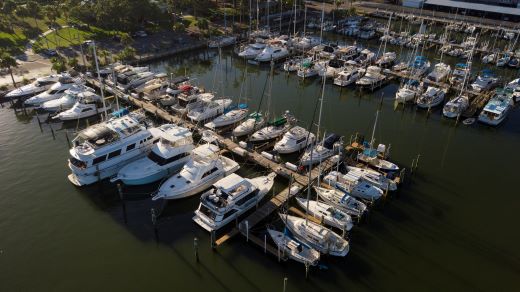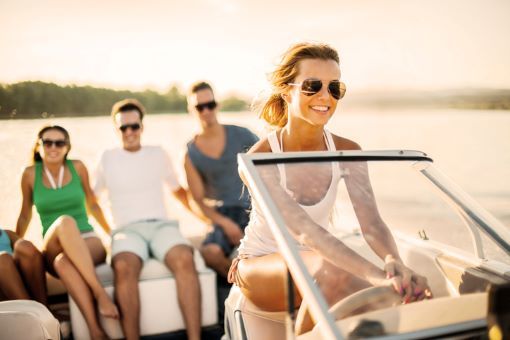You've got your boat bag packed, you're covered in sunscreen, and you're making your way to the marina. Before you head out to enjoy a day on the water, remember that boating safety must come first.
By prioritizing marina safety, you can feel confident as a responsible captain of a fun day on the water. In this post, we'll explain the importance of following these marina safety tips.
12 Safety Tips to Follow at Boat Marinas
1. Wear Your Life Jacket
Remember to wear your life jacket or personal flotation device (PFD) when stepping onto the dock or near the water. Life jackets can be life savers during an accidental fall into the water.
Before heading out, ensure everyone has a clean, properly fitting life jacket that meets safety regulations.
2. Watch Your Step: Mind Slippery Surfaces
Boat docks and decks seem stable but can easily get slippery, especially when wet. Be cautious when walking on docks and decks, and encourage children to walk slowly.
Wear appropriate non-slip shoes with good traction and consider using non-slip mats and treatments to enhance safety on slippery surfaces.
Learn More About Safe Boating with Children
3. Respect No-Wake Zones
Take a slow, no-wake speed when cruising within your marina and other no-wake zones. No-wake zones are designated to protect swimmers, small boats, docks, and the shore from excessive wake turbulence – keeping everyone safe.
Also, take it slow in crowded or tight areas to minimize the risk of accidents due to your boat's wake.
4. Watch for Other Boats and Pedestrians
Staying aware of other boats and people is always critical when boating. Keep watch for other boats, kayakers, paddleboarders, and people on the docks. Use hand signals or signaling devices to communicate with others when necessary, taking extra care in crowded areas.
Looking out for fellow boaters is just one among the numerous responsibilities that boat captains must manage. Watch the video below to learn more about boat captain's duties.
5. Understand the Marina's Layout
Familiarize yourself with the marina layout and take note of emergency equipment locations, fire extinguishers, and first aid stations. Knowledge of these safety essentials can make a difference in an emergency.
6. Obey Posted Rules and Regulations
Pay attention to all posted signs, speed limits, and other regulations within the marina. The rules are intended to keep everyone safe and must be taken seriously.
Failure to follow marina etiquette and regulations can create dangerous situations and have your access revoked.
7. Secure Your Boat Properly
Properly tie your boat to the dock using the appropriate lines and fenders. A securely anchored boat prevents damage to your boat and other boats nearby. An unsecured boat is dangerous and can be a costly mistake.
8. Shore Power Connections
Safety must be the top priority when using shore power. Ensure proper electrical connections and grounding to avoid electrical hazards. Regularly inspect electrical equipment to ensure safe operation, and do not use any unsafe electrical equipment.
9. Maintain Water Evacuation Systems
Ensuring proper water evacuation systems and the correct functioning of bilge pumps is a critical aspect of boat maintenance and safety.
Water can enter a boat from just about everywhere, from leaks, waves, and even rain. Having reliable systems in place is essential to keep your boat dry and stable. Regularly inspect and test your boat's bilge pump to ensure it's in good working condition.
10. Avoid Swimming in the Marina
Swimming in the marina area is dangerous due to boat traffic, electrical shock, and submerged hazards – not to mention that the water may be contaminated with oils and other fluids from the nearby boats.
Always use designated swimming areas away from boats and keep a watchful eye on children near the water.
11. Keep the Marina Clean
You are responsible for disposing of all trash while on the water. Take everything you brought with you and dispose of waste in designated bins. Keeping the space safe and clean benefits everyone, including marine life.
12. Follow Fuel Safety Guidelines
Adhering to safe fueling practices at the marina protects you, your boat, and the environment:
- Before fueling, turn off all engines, generators, and electrical equipment on board.
- Ensure proper ventilation of the boat's fuel compartment before and during fueling.
- Keep a fire extinguisher nearby in case of a fuel spill or fire.
- Never smoke on board while fueling.
- Properly ground the boat to avoid static electricity buildup.
- Use a fuel spill containment pad or absorbent material to catch accidental spills.
- Fill the fuel tank slowly and prevent overfilling.
- Avoid misfueling.
- Clean up spills immediately using absorbent pads.
- Use the correct fuel for your boat.
- Regularly inspect fuel lines and connections for signs of wear, damage, or leaks.
- Be cautious with portable fuel containers.
Conclusion: Follow These Boat Marina Safety Tips
By following these marina safety tips, you'll hit the waters confidently, knowing you have taken every precaution to protect yourself and fellow boaters. Whether you're a seasoned boater or a first-time captain, staying vigilant and prepared for any situation is the key to a successful outing on the water.


